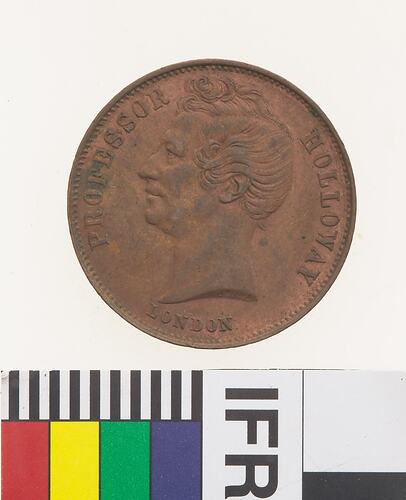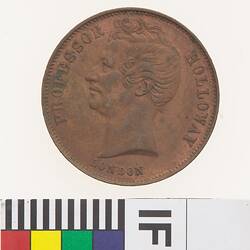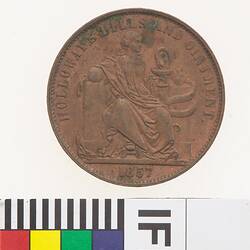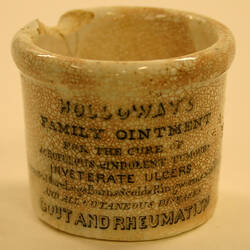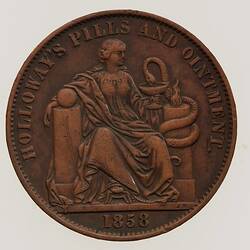Summary
Copper Halfpenny Token minted by J. Moore of Birmingham. Issued to promote Professor Holloway's pills and ointments in 1857. Holloway tokens are presumed to have been circulated worldwide throughout retailers of Holloway products. Holloway's tokens were produced in large numbers and have proven the most common token finds on Melbourne archaeological sites.
Previous Collections: Henry S. Smith (South Australia)
Physical Description
A round copper striking of a Professor Holloway token (28 mm diameter). The token features a profile head of Professor Holloway and a rendition of the classical goddess Hygeia (the ancient Greek goddess of health) seated looking at snake drinking from a cup she holds in her left hand, the snake is curled around a burning altar, an orb rests on altar on her right side. The legend promites Holloway's pills and ointments and gives the date 1857.
Obverse Description
Head of Professor Holloway facing left with J. MOORE (the maker's name) incuse on neck truncation; around, PROFESSOR HOLLOWAY; below, LONDON.
Reverse Description
Hygeia (the ancient Greek goddess of health) seated looking at snake drinking from a cup she holds in her left hand, the snake is curled around a burning altar, an orb rests on altar on her right side, around; HOLLOWAY'S PILLS AND OINTMENTS. in exergue, 1857. The makers initials J.M incuse at the left of the exergue line.
More Information
-
Collecting Areas
Medicine & Health, Numismatics & Philately, Working Life & Trades
-
Acquisition Information
Cultural Gifts Donation from Mr Robert (Bob) Edwards, 1989
-
Date Issued
1857 AD
-
Issued By
-
Mint
-
Place & Date Used
-
Previous Collection
-
Inscriptions
Obverse: PROFESSOR HOLLOWAY LONDON J. MOORE Reverse: HOLLOWAY'S PILLS AND OINTMENTS 1857
-
Denomination
-
Series
-
Material
Copper
-
Axis
12
-
Classification
-
Category
-
Discipline
-
Type of item
-
Dimensions
29 mm (Outside Diameter), 8.14 g (Weight)
-
Shape
Round
-
References
Holloway's tokens were struck in such large numbers that the minting technique of hubbing was clearly employed. In this a master tool, having the full appearance of the final token for the obverse and reverse is manufactured in steel. This is then used to prepare working dies. This technique makes the identification of individual dies from variations in rim bead counts or alignment of lettering impossible. Researchers have noted minor variations in the lowest relief areas of the tokens that may be the result of variations of quality of the die production off the hub (Heyde p. 49) or minor tooling. These are noted in the descriptions but museum storage is based on denomination and date.
[Book] Andrews, Arthur. 1921. Australasian Tokens and Coins., No.666
[Book] Heyde, Gilbert C. & Skinner, Dion H. 1967. Unofficial Coins of Colonial Australia and New Zealand., No.120/1
-
Keywords
